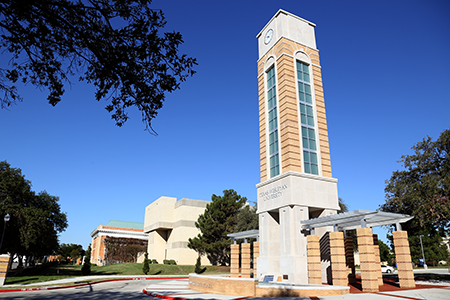Texas Wesleyan receives $1.45 million Robert Noyce Scholarship grant
.jpeg)
Texas Wesleyan University is pleased to announce a five-year grant of $1,450,000 from the National Science Foundation in support of the Robert Noyce Teacher Scholarship Program.
The funded project, titled "An Inclusive Approach to Recruit and Prepare STEM Teachers for Urban Schools: A Noyce Track 1 Project," is a Fort Worth-based educational partnership that seeks to change the landscape of STEM teacher recruitment, preparation and retention in urban public schools. This collaborative effort is a partnership among Texas Wesleyan University, Tarrant County College District, Fort Worth Independent School District (FWISD) and the Leadership Academy Network (LAN).
“We’ve been working toward this for three years,” said Dr. Elizabeth Ward, Associate Professor of Education at Texas Wesleyan and the Principal Investigator (PI) on the grant. “I’m excited to work with our partners to increase the number of highly qualified STEM teachers working with K-12 students in FWISD and the LAN.”
The main goal of the Noyce project over the next five years is to graduate 20 highly qualified math, science or computer science teachers who gain certification and work in high-need schools in Fort Worth ISD. The program offers scholarships up to $23,400 per year to juniors and seniors.
“For our STEM majors, this gives them another major career track in addition to working in a lab or for a company,” said Dr. Ricardo E. Rodriguez, co-PI on the grant and Dean of the Texas Wesleyan School of Arts and Sciences. “This is also a natural area for us, since we offer chemistry camps in the summer for elementary students and mathematics/pre-engineering camps for junior high students. We have a solid pipeline of students for this program.”
The partnership with Tarrant County College District is intended to allow high school graduates to attend either TCCD or Texas Wesleyan during their first two years to receive early experiences in STEM classrooms to see if teaching might be a career of interest. If so, they can then apply for the scholarship for their third and fourth years at Texas Wesleyan.
“For our Teacher Education program, this partnership just makes sense,” said co-PI Dr. Shereah Taylor-Love, Dean of Behavioral and Social Sciences at Tarrant County College District. “Most of our students who enter the program will essentially have their third and fourth years of college paid for.”
Because of the need for more secondary STEM teachers in Fort Worth ISD, the program will create a positive feedback loop by recruiting graduates from the school district, training them for four years, and then placing them back in the district as highly trained STEM teachers. For each year a student receives the Noyce Scholarship, they must agree to serve two years in a high-need school district.
“This is a perfect partnership for Fort Worth ISD,” said David Saenz, Chief Innovation Officer at Fort Worth ISD. “STEM teacher positions are always hard to fill, so having a steady pipeline of teachers each year who have agreed to serve two years for each year they received the scholarship fills a big need for us.”
The program is designed to be a win for each partner involved. TCCD’s Teacher Education program will have a focused outcome through Texas Wesleyan, Fort Worth ISD will have a steady pipeline of STEM teachers and Texas Wesleyan STEM majors will have revamped teaching options in science, math and computer science.
“This is an obvious fit for our Mathematics with Secondary Certification degree,” said Dr. Luis Aguirre, co-PI and Texas Wesleyan Assistant Professor of Mathematics. “My hope is that we can recruit more than four new Noyce Scholars every year.”
Ultimately, the broad impact of the program will be the creation of an ecosystem of STEM education awareness, enriched STEM opportunities for P-12 students, and a systematic process for the recruitment, development, induction and retention of diverse, highly qualified STEM teachers.
“Growing our STEM programs at Texas Wesleyan is something that we must do,” said Dr. Hector Quintanilla, Texas Wesleyan Provost and Senior Vice President for Academic Affairs. “And the best way to grow is with partnerships that benefit everyone involved, most importantly, the students.”








